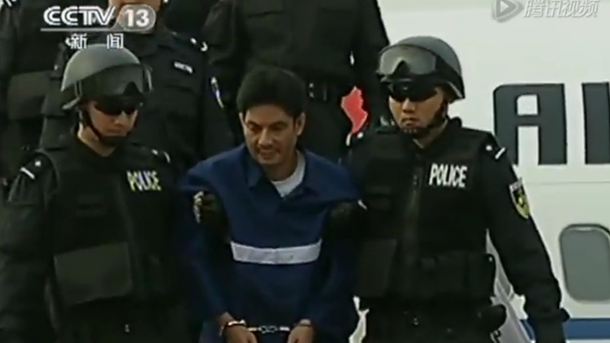HONG KONG — Naw Kham was to be killed in a drone attack, the official in charge of hunting the Burmese militia leader down revealed in an interview with a Chinese newspaper. The attack would have been the first known drone killing by Chinese authorities abroad.
The Burmese citizen is currently awaiting the confirmation of his execution order by China’s Supreme People’s Court in a Yunnan prison. In November last year, he had been convicted of murdering 13 Chinese sailors in an attack on two Chinese ships on the Mekong River a year earlier.
Amid a public outcry in China after images of the brutal murders spread and brought trade on the river to a halt, the Chinese Ministry of Public Security had formed an investigative unit to arrest the culprits.
In April last year, Naw Kham was arrested by Lao authorities while crossing into the country from Burma, subsequently extradited to China and brought to trial in Kunming, the capital of Yunnan, China’s province bordering the Golden Triangle. He maintained his innocence during the trial.
Before his final capture, Naw Kham had evaded arrest three times, Liu Yuejin, head of the investigative unit and director of the Narcotics Control Bureau of the Ministry of Public Security, told the Chinese national newspaper Global Times in an interview published on Monday, but conducted earlier in winter in Beijing.
On one occasion, the Chinese investigative unit had closed in on his camp at an unspecified location in Burma. Because reaching the camp would require a 2-km march past likely booby traps, a member of the investigative unit suggested to have an unmanned aircraft drop 20 kg of TNT explosives on the camp, Liu told the Global Times.
“We suggested the method to upper levels, but it was rejected. He had to be caught alive,” he said.
After five days of observation, a unit member inadvertently alerted a sentry and Naw Kham evaded capture. The interview only gives a vague idea of when the botched capture attempt happened, but it suggests that it happened sometime between late 2011 or early 2012.
Liu added that the Beidou Navigation Satellite System, China’s nascent alternative to the GPS navigation system, was used to “eavesdrop, locate, analyze and screen” a Burmese contact of Naw Kham that ultimately led the unit to the discovery of the camp.
The special unit had started its investigation by selecting a drug dealer “with a wide network of contacts.” They detained the person, brought him to China and questioned him for a week until he provided the name of a member of Naw Kham’s militia who commuted regularly between the area where the crime happened on the Lao-Burmese border and the Fourth Special Region in Burma’s Shan State.
Naw Kham, a rogue former supply officer of the Mong Tai Army controlled by the late Burmese drug lord Khun Sa, had been operating a protection racket taxing drug smugglers since Khun Sa’s retirement in the late 1990s with a force of around 100 men, Xian Yanming, a member of the Chinese investigative team, told Chinese Central Television last year.
The 43-year old ethnic Shan had been wanted by Chinese, Thai, Lao and Burmese authorities as well as the Shan State State Army and the United Wa State Army.
The Naw Kham trial was the first of a foreigner for crimes committed against Chinese nationals outside the country’s territory. Although China does not publish the number of people it executes every year, Amnesty International estimates several thousand receive death sentences.
















